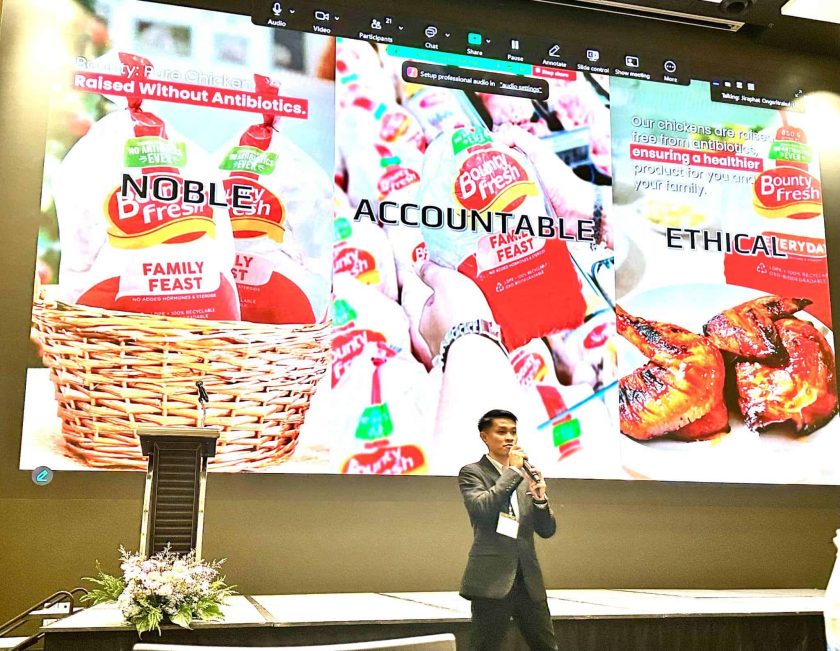Besides providing quality food, the commitment of the Philippines’ Bounty encompasses the company’s responsibility to the broader ecosystem of animal and human health.
This dedication was recently showcased on a regional platform as Mark Anthony L Gabriel, Associate Vice President for Animal Health Group of Bounty Plus Inc, represented Bounty and the Philippine poultry industry at the Regional Workshop for Private Sector Engagement on Antimicrobial Resistance (AMR).
Bounty Fresh, the first in the Philippines to be certified by Lloyd’s Register Quality Assurance (LRQA) for its No Antibiotics Ever (NAE) program, participated in the event.
Dr Gabriel’s presence at the workshop, hosted by the FAO Regional Office for Asia and the Pacific in collaboration with Tripartite Partners – the WHO and the WOAH – in Bangkok, Thailand, from June 23 to 24, 2025, underscored the critical role of the private sector in combating AMR, especially within animal production systems.
Tackling a global health challenge
Supported by the European Commission through the project ‘Working together to fight AMR in Asia’, this regional workshop gathered hundreds of stakeholders from both public and private sectors across a vast region, including countries like China, India, Indonesia, Malaysia, the Philippines, Thailand, Vietnam, Japan, and South Korea.
The core objectives were clear:
- to strengthen collaboration between governments, industry, and global health organizations;
- to share best practices and successful models;
- to develop effective communication strategies;
- to explore improved regulatory frameworks; and
- to showcase innovations that reduce the need for antimicrobials in food-producing animals.
This collaborative spirit is vital in addressing one of the most pressing global health threats: AMR.
Bounty’s leadership in sustainable practices
On day-2 of the workshop, Dr Gabriel contributed to a dedicated session featuring private sector stakeholders.
He shared Bounty Plus Inc’s journey in implementing antimicrobial stewardship practices, particularly the company’s pioneering work in NAE poultry production.
His presentation highlighted how sustainable production practices, robust animal health programs, and strategic investment in alternatives to antibiotics have enabled Bounty to significantly reduce reliance on antimicrobials while ensuring animal welfare and food safety.
Bounty’s team specifically showcased best practices in antimicrobial stewardship and detailed initiatives supporting comprehensive farm-level health and sustainability. All with the goal of mitigating AMR.
The impact of Bounty’s presentation was palpable. “They were genuinely surprised how Bounty reduced antibiotic usage over the course of five years. Many companies have no idea of their total antibiotic usage,” said Dr Gabriel.
“Comparing Bounty to the global usage of antibiotics presented, they were asking how we managed to do it 100%.”
Bounty’s commitment to verifiable standards was also a point of strong interest due to the rigorous surveillance auditing of its LRQA Certification.
Bounty’s proactive stance set a new benchmark, as Dr Gabriel stated, “We implemented NAE before our Philippine government even drafted the National Action Plan for Antimicrobials in 2015 and a new publication in 2023.”
Insights for collective progress
The workshop provided a robust platform for knowledge exchange and strategic planning.
Participants reviewed the global and regional status of AMR in livestock production, identified implementation gaps, and reinforced the importance of multi-sectoral collaboration across veterinary, agriculture, environment, and public health sectors.
A key highlight was the strategic communication planning activity, focusing on ‘From Awareness to Action’, which involved media landscaping, stakeholder analysis, and tailored message development.
Discussions also emphasized using behavioral science tools and incentive programs to reduce non-essential antibiotic use on farms. Countries, including the Philippines, shared success stories, particularly in antibiotic-free certification programs and public-private partnerships in feed regulation to help combat antimicrobial resistance.
The key takeaways were clear:
- AMR control requires collaborative, cross-sector strategies rooted in strong national policies;
- targeted communication and community engagement are vital for behavior change at the farm level; and
- FAO’s continued technical support and regional workshops play a crucial role in harmonizing efforts across Southeast Asia.
Bounty’s impact on the world stage
Bounty’s dedication to responsible antimicrobial stewardship did not go unnoticed. David Sutherland, FAO’s Animal Production and Health Officer, commended Bounty’s program on NAE, stating it was “commendable.”
Furthermore, the organizers of the workshop expressed interest in interviewing Bounty to get a short video or snippet to incorporate into success stories of private sectors for antimicrobial resistance and antimicrobial usage.
This workshop was more than just a meeting, it was a powerful call to action for companies, governments, and international partners to collaborate more closely in addressing the growing threat of antimicrobial resistance.
The inclusion of private sector leaders like Dr Gabriel ensures that industry insights and innovations contribute meaningfully to the global antimicrobial resistance mitigation agenda.
Bounty is honored to represent the Philippine poultry sector and remains committed to engaging in productive dialogue with regional partners to create lasting, science-based solutions that safeguard both animal and human health, ensuring ‘Lives Made Brighter’ through ‘Food Made Better’ as the company continues to fight AMR.

